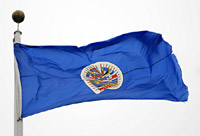Marta Erquicia is a Senior Programme Coordinator for the Americas at Transparency International.
In 1996, countries across the Americas joined forces to establish the Inter-American Convention against Corruption in response to a string of high level corruption scandals that hit the region.
It was the first time globally that states agreed on having a joint framework to fight corruption across borders. The convention also outlined a clear road map for countries to use in fighting corruption at the national level.
But conventions can only be effective if countries translate them into actual implementation. To address this, a follow-up mechanism, known as MESICIC (Mecanismo de Seguimiento de la Implementación de la Convención Interamericana contra la Corrupción), was established in 2003 to help States, civil society and other actors assess how countries are performing in the convention’s implementation, understand their needs and assist them where required.
Fifteen years have passed since the convention was established but corruption continues to be a major problem in the region. High levels of corruption and impunity go hand-in-hand with inequality, violence and poverty. Despite the economic growth in the last few years, nearly 200 million people, a third of the population in the region, live in poverty and 13 per cent in extreme poverty. Weak institutions, low levels of governance and state capture negatively affect efforts to promote equitable and sustainable human development.
In order to better understand how each country is living up to its promises under the convention, external reviewers will visit the countries from next year. This process involves meeting with government agencies, civil society, business representatives and other actors to assess if the convention’s implementation is adequate, why States are having problems and what technical assistance they would benefit from most.
These country visits will not be a magic bullet for ending corruption in the Americas, but they constitute the most reliable method of obtaining first-hand and objective information on the convention’s implementation. It is a process already in use for other international conventions like the UN Convention against Corruption and the OECD convention against foreign bribery.
The catch is that the MESICIC countries must agree to the visits and express their willingness to the Organization of American States in writing by 12 September.
17 countries have already shown their commitment but 14 countries still remain: the Bahamas, Canada, the Dominican Republic, Ecuador, Haiti, Honduras, Jamaica, Mexico, Nicaragua, Peru, Saint Vincent, Suriname, Trinidad and Tobago, and Venezuela.
If these countries do not sign up, they will not be included in the round of country visits next year and evaluators will be missing a great deal of information to assess what challenges countries face implementing certain parts of the convention and will not be able to provide them with the help needed. The subsequent round of country visits will not occur until at least 2015.
















 Connect with us on Facebook
Connect with us on Facebook Follow us on Twitter
Follow us on Twitter